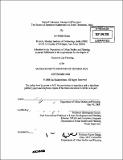Desired outcomes, unexpected processes : two stories of sanitation maintenance in Erode tenements, India
Author(s)
Balakrishnan, Sai
DownloadFull printable version (21.37Mb)
Alternative title
Two stories of sanitation maintenance in Erode tenements
Other Contributors
Massachusetts Institute of Technology. Dept. of Urban Studies and Planning.
Advisor
Bishwapriya Sanyal.
Terms of use
Metadata
Show full item recordAbstract
A central challenge facing municipalities in developing countries is the successful maintenance of sanitation services for their urban poor. Not only are municipalities struggling to cope with increased sanitation coverage to their urban poor, but the challenge of successful sanitation delivery is further compounded by the poor maintenance of sanitation systems, thus rendering the existing infrastructure unusable. This thesis focuses on septic tank maintenance in tenements' in small municipalities in Erode district, India. The findings of this thesis are that the desired outcome of good sanitation maintenance in the Erode tenements is due to variables that are often overlooked in the maintenance literature and also due to unexpected processes that defy conventional wisdom on effective service delivery for the urban poor. Three variables that contributed to good sanitation maintenance in the Erode tenements are: 1) design: the location of the septic tank system played an important role in maintenance, 2) bundling of services: linking septic tank maintenance to use of public taps helped tenement residents monitor and enforce septic tank maintenance, and 3) decentralization: the changing relationship between the tenement residents and the municipality, through the process of decentralization, from a patron-client one to one akin a commercial transaction, partially explains the good performance in septic tank maintenance. The findings of this thesis shed light on the variables that do matter for good sanitation maintenance and show how incentives and institutional arrangements can be structured differently to achieve the desired outcome of well-maintained, long-lived sanitation systems.
Description
Thesis (M.C.P.)--Massachusetts Institute of Technology, Dept. of Urban Studies and Planning, 2008. Includes bibliographical references (p. 93-95).
Date issued
2008Department
Massachusetts Institute of Technology. Department of Urban Studies and PlanningPublisher
Massachusetts Institute of Technology
Keywords
Urban Studies and Planning.